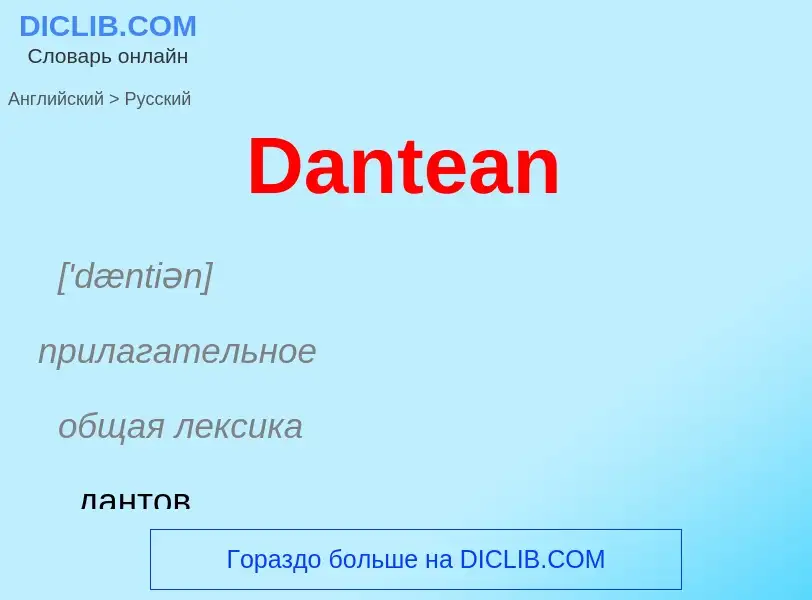Tradução e análise de palavras por inteligência artificial ChatGPT
Nesta página você pode obter uma análise detalhada de uma palavra ou frase, produzida usando a melhor tecnologia de inteligência artificial até o momento:
- como a palavra é usada
- frequência de uso
- é usado com mais frequência na fala oral ou escrita
- opções de tradução de palavras
- exemplos de uso (várias frases com tradução)
- etimologia
Dantean - tradução para russo
['dæntiən]
прилагательное
общая лексика
дантов
дантовский
существительное
['dæntiən]
общая лексика
исследователь Данте
['dɑ:ntə]
существительное
зоология
тапир американский (Tapirus americanus)
Definição
Wikipédia

Dante Alighieri (Italian: [ˈdante aliˈɡjɛːri]; c. 1265 – 14 September 1321), probably baptized Durante di Alighiero degli Alighieri and often referred to as Dante (English: , US: ), was an Italian poet, writer and philosopher. His Divine Comedy, originally called Comedìa (modern Italian: Commedia) and later christened Divina by Giovanni Boccaccio, is widely considered one of the most important poems of the Middle Ages and the greatest literary work in the Italian language.
Dante is known for establishing the use of the vernacular in literature at a time when most poetry was written in Latin, which was accessible only to educated readers. His De vulgari eloquentia (On Eloquence in the Vernacular) was one of the first scholarly defenses of the vernacular. His use of the Florentine dialect for works such as The New Life (1295) and Divine Comedy helped establish the modern-day standardized Italian language. His work set a precedent that important Italian writers such as Petrarch and Boccaccio would later follow.
Dante was instrumental in establishing the literature of Italy. His depictions of Hell, Purgatory and Heaven provided inspiration for the larger body of Western art and literature. He influenced English writers such as Geoffrey Chaucer, John Milton and Alfred Tennyson, among many others. In addition, the first use of the interlocking three-line rhyme scheme, or the terza rima, is attributed to him. He is described as the "father" of the Italian language, and in Italy he is often referred to as il Sommo Poeta ("the Supreme Poet"). Dante, Petrarch, and Boccaccio are also called the tre corone ("three crowns") of Italian literature.





![Giotto]], in the chapel of the [[Bargello]] palace in Florence. This oldest picture of Dante was painted just prior to his exile and has since been extensively restored. Giotto]], in the chapel of the [[Bargello]] palace in Florence. This oldest picture of Dante was painted just prior to his exile and has since been extensively restored.](https://commons.wikimedia.org/wiki/Special:FilePath/Dante-alighieri.jpg?width=200)

![Mural of Dante in the [[Uffizi]], Florence, by [[Andrea del Castagno]], c. 1450 Mural of Dante in the [[Uffizi]], Florence, by [[Andrea del Castagno]], c. 1450](https://commons.wikimedia.org/wiki/Special:FilePath/DanteFresco.jpg?width=200)
![Dante from [[Promptuarium Iconum Insigniorum]] Dante from [[Promptuarium Iconum Insigniorum]]](https://commons.wikimedia.org/wiki/Special:FilePath/Dante Alighieri (Prom).jpg?width=200)
![Dante Alighieri, detail from [[Luca Signorelli]]'s fresco in the Chapel of San Brizio, [[Orvieto Cathedral]] Dante Alighieri, detail from [[Luca Signorelli]]'s fresco in the Chapel of San Brizio, [[Orvieto Cathedral]]](https://commons.wikimedia.org/wiki/Special:FilePath/Dante Luca.jpg?width=200)

![Dante, poised between the mountain of purgatory and the city of Florence, displays the [[incipit]] ''Nel mezzo del cammin di nostra vita'' in a detail of [[Domenico di Michelino]]'s painting, Florence, 1465 Dante, poised between the mountain of purgatory and the city of Florence, displays the [[incipit]] ''Nel mezzo del cammin di nostra vita'' in a detail of [[Domenico di Michelino]]'s painting, Florence, 1465](https://commons.wikimedia.org/wiki/Special:FilePath/Domenico di Michelino - Dante Illuminating Florence with his Poem (detail) - WGA06423.jpg?width=200)
.jpg?width=200)
.jpg?width=200)
![Illustration for ''Purgatorio'' (of ''The Divine Comedy'') by [[Gustave Doré]] Illustration for ''Purgatorio'' (of ''The Divine Comedy'') by [[Gustave Doré]]](https://commons.wikimedia.org/wiki/Special:FilePath/Purgatory (Purgatorio).jpg?width=200)

 II.jpg?width=200)
